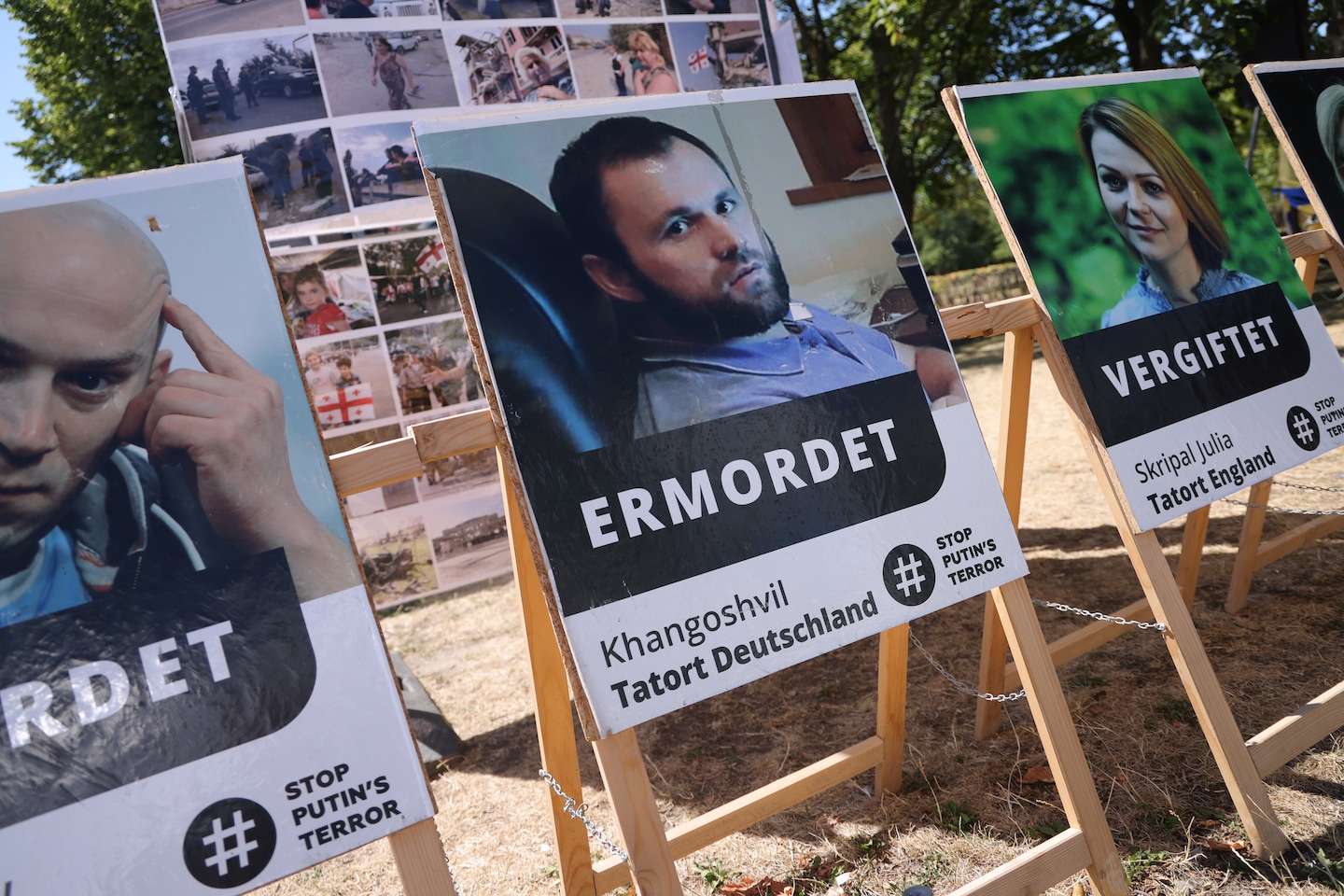No master criminal or global “merchant of death,” Krasikov, who investigators say did dirty work for Russia’s Federal Security Service, or FSB, apparently bungled the escape. He was arrested after police found him removing a disguise in a bush.
For their differences, Krasikov and Bout have a key fact in common: Convicted of high-profile crimes connected to the interests of the Russian state and held abroad, they both became bargaining chips in high-stakes talks to free Americans held in Russia.
Many Russian agents are held around the world, but there appears to be something special about Krasikov for Moscow. However, his status as a brazen assassin, and the fact that he is held in Germany as opposed to the United States and has served only a fraction of his life sentence, make his potential exchange a tall order for Washington.
The Russians “do want him badly indeed,” said Christo Grozev, executive director of the investigative outlet Bellingcat, which helped establish Krasikov’s true identity and his links to the Russian state.
U.S. officials are set to meet with their Russian counterparts this week to discuss Whelan, whom a Russian court convicted of espionage in 2019 in a case that his family and the U.S. government say was politically motivated, White House national security adviser Jake Sullivan told reporters Monday. The White House maintains that efforts to include him in the swap that freed Garner were unsuccessful.
The push for a swap could be a nonstarter: German media outlets report that German officials have refused requests to release the convicted assassin.
“The big challenge we had over the course of the past several months is that what Russia was asking for to secure Paul Whelan’s release was not something that we had to be able to give,” Sullivan said at a news briefing.
Unlike Bout, who was convicted in 2011 of charges including conspiracy to kill U.S. nationals, Krasikov’s alleged crimes are not connected to the United States. And while Bout had served 15 years after he was ensnared in a complex Drug Enforcement Administration sting that led to his arrest in Thailand, Krasikov was convicted only in late 2021 for the killing of Zelimkhan “Tornike” Khangoshvili, a Chechen born in Georgia who was opposed to the leadership of Putin ally Ramzan Kadyrov.
David Whelan, the bother of Paul, wrote in an email that his family knew of various speculated trades, but they weren’t clear who the Russians were after or even who was really making the decision. He said that the Russian Foreign Ministry had noted a number of Russians held by U.S. authorities, including convicted hacker Roman Seleznev and alleged money launderer Alexander Vinnik.
Some officials say they believe that Russian demands for Krasikov were never serious and only designed as a stalling tactic.
Speaking to ABC News on Sunday, White House National Security Council spokesman John Kirby said that offers to trade Krasikov for Griner this summer were not considered a “serious offer.”
“He’s not in our custody,” Kirby said.
Liana Fix, an expert on Europe at the Council on Foreign Relations, a U.S. think tank, said that Russia might have thought Washington could simply tell Berlin to release Krasikov. “It fits Russia’s worldview, where U.S. allies are regarded as satellites under U.S. control.”
But Germany is unlikely to hand over a convicted murderer as “spectacular and high-profile as Krasikov,” she said, with the new government seeking to avoid criticism for being soft on Russia. Germany’s top prosecutor handled the case, and the judge spoke of state terrorism in his judgment.
Though Krasikov was traveling on a false passport, under the name “Vadim Sokolov,” investigators from Bellingcat working with Russian outlet the Insider and Germany’s Der Spiegel found evidence that he was in fact Vadim Krasikov — a man linked to a similar assassination, also carried out on a bicycle, in Moscow in 2013.
Although Moscow fiercely denied any links to the crime, evidence also emerged that Russian authorities had removed Krasikov’s details from various databases after the 2013 murder. Krasikov did not help matters by requesting books about Soviet spies from his German jailers, according to reports in the German media.
“His release would confirm what Russia has always denied — but then Moscow obviously doesn’t care about the contradiction,” said Fix.
Like Bout, who was suspected of maintaining ties to Russia’s military intelligence wing, the GRU, Krasikov may be considered loyal for refusing to talk to Western authorities. But his status as an assassin could give him an edge in Moscow’s estimations, as well.
Writing for the Center for European Policy Analysis, exiled Russian investigative journalists Irina Borogan and Andrei Soldatov note that while spies and hackers are useful to Moscow, assassins who travel internationally serve a special purpose: instilling fear, or worse, among Russian emigres.
“The Kremlin is not short of assassins, and yet it wants this one to return home,” Borogan and Soldatov write. “This tells assassins that their work is valued, and it tells emigres that their lives are of little concern to the West; that their murderers will go free.”
Mark Galeotti, an expert on Russian security, said that the release of Krasikov would also reassure other would-be assassins. “It is the price of running these kind of risky and murderous covert operations abroad,” he said. “If you do not demonstrate that you will stay loyal to your own when they are caught, whether they are gangsters or professional operatives, how can you expect them to stay quiet, and what chance do you have of recruiting the next ones?”
Grozev of Bellingcat offered a similar view. “‘Leaving him behind’ breaks their model of sending future assassins abroad: If the assassins don’t believe they will be extracted, no one will take the risk,” he said.
Krasikov appears to have gotten the message. “Russia knows I am here and will not forget me,” he said, shortly after his arrest in 2019, according to local media reports.



